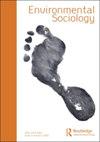社区共享:人口减少的后碳社会中的可持续流动性
IF 2.8
Q3 ENVIRONMENTAL STUDIES
引用次数: 3
摘要
摘要:本文从用户的角度研究了东京外卫星城柏华市共享出行的新举措。在日本,交通运输部门的碳排放量几乎占到总排放量的20%。与此同时,人口减少导致公共交通工具使用量下降,降低了农村和偏远地区居民的生活质量水平。这使得居民依赖私家车,最终增加了碳排放。讨论了可持续交通解决碳排放和居民福利问题的三个关键问题。柏川市已经试验了新的共享交通服务,包括固定路线的微型巴士和更灵活的社区出租车。本文探讨了这种社区移动服务的用户感知和体验,并从移动实践的角度来考虑这三个问题。对城市官员和交通服务运营商进行了背景访谈,并进行了人种学研究,并进行了现场对话,以探索交通的效用和意义。为了增加公共交通的使用,进一步减少交通运输产生的二氧化碳排放,从用户的角度更加关注移动性的实践是很重要的。(200字)本文章由计算机程序翻译,如有差异,请以英文原文为准。
Community sharing: sustainable mobility in a post-carbon, depopulating society
ABSTRACT This paper examines new initiatives in shared mobility of Kashiwa City, a satellite town outside Tokyo, from the users’ perspective. In Japan, the transport sector accounts for almost 20% of carbon emissions. At the same time, a population decrease has led to a decline in use of public transport, reducing the level of the quality of life of residents who live in rural and remote areas. This makes residents depend on private cars, ending up contributing to carbon emissions. Three key issues for sustainable mobility to tackle carbon emissions and residents’ wellbeing issues are discussed. Kashiwa City has experimented with new shared transport services with fixed-route microbuses and more flexible community taxis. The paper explores user perception and experience of such community mobility services and considers the three issues from the viewpoint of the practice of mobility. Background interviews were conducted with the city’s officials and transport service operators, and an ethnographic study was carried out and in-situ conversations were made to explore the utility and meaning of mobility. To increase use of public transport to further reduce CO2 emissions from transport, it is important to pay more attention to the practice of mobility from the user’s perspective. (200 words)
求助全文
通过发布文献求助,成功后即可免费获取论文全文。
去求助
来源期刊

Environmental Sociology
ENVIRONMENTAL STUDIES-
CiteScore
4.60
自引率
12.00%
发文量
34
期刊介绍:
Environmental Sociology is dedicated to applying and advancing the sociological imagination in relation to a wide variety of environmental challenges, controversies and issues, at every level from the global to local, from ‘world culture’ to diverse local perspectives. As an international, peer-reviewed scholarly journal, Environmental Sociology aims to stretch the conceptual and theoretical boundaries of both environmental and mainstream sociology, to highlight the relevance of sociological research for environmental policy and management, to disseminate the results of sociological research, and to engage in productive dialogue and debate with other disciplines in the social, natural and ecological sciences. Contributions may utilize a variety of theoretical orientations including, but not restricted to: critical theory, cultural sociology, ecofeminism, ecological modernization, environmental justice, organizational sociology, political ecology, political economy, post-colonial studies, risk theory, social psychology, science and technology studies, globalization, world-systems analysis, and so on. Cross- and transdisciplinary contributions are welcome where they demonstrate a novel attempt to understand social-ecological relationships in a manner that engages with the core concerns of sociology in social relationships, institutions, practices and processes. All methodological approaches in the environmental social sciences – qualitative, quantitative, integrative, spatial, policy analysis, etc. – are welcomed. Environmental Sociology welcomes high-quality submissions from scholars around the world.
 求助内容:
求助内容: 应助结果提醒方式:
应助结果提醒方式:


